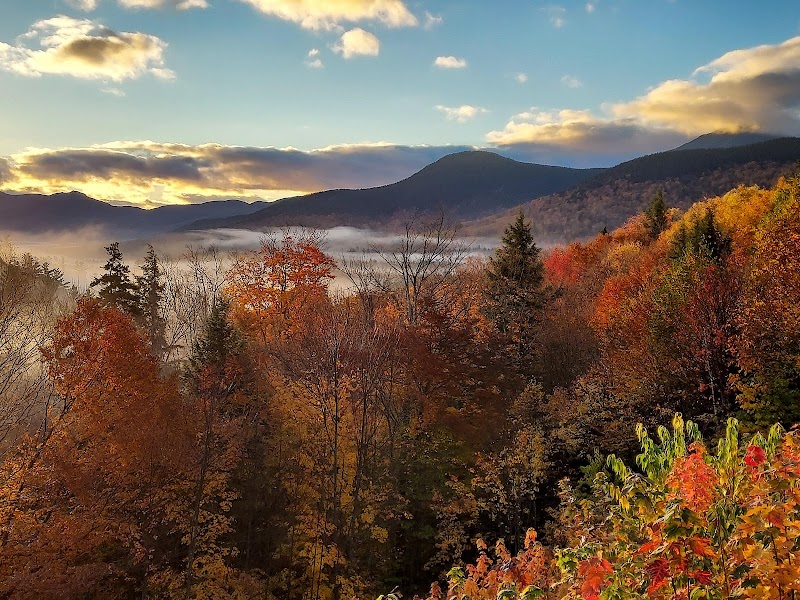
Explore Squam Lakes Natural Science Center Special Programs: Adventure and Learning in Center Harbor, NH
Engage with New Hampshire’s wild heart at Squam Lakes Natural Science Center Special Programs. These hands-on experiences blend guided wildlife encounters with accessible hiking trails, offering practical adventure and education for every nature enthusiast.
Wear Sturdy Footwear
Trails can get slippery due to wetland proximity and forest floor debris. Durable hiking shoes with good traction will keep you steady.
Bring Refillable Water
Hydration stations aren’t plentiful; carry a refillable water bottle to stay energized during programs outdoors.
Arrive Early Morning
Morning light penetrates the trees best and wildlife is often most active then, enhancing your experience and photo ops.
Check Weather Before Visiting
Natural elements command respect—storms or heavy rain can alter trails quickly. Plan visits on stable weather days for safety.
Explore Squam Lakes Natural Science Center Special Programs: Adventure and Learning in Center Harbor, NH
Squam Lakes Natural Science Center in Center Harbor, New Hampshire, offers more than just static exhibits—it brings nature alive through its dynamic Special Programs designed to engage visitors of all ages. These programs provide a hands-on encounter with New England’s wild inhabitants and the ecosystems that surround them, making adventure and education inseparable. Here, every visit turns into an interactive expedition rather than a simple walk.
The Special Programs include guided animal encounters, live demonstrations, and seasonal workshops that allow adventurers to witness creatures fiercely existing in their habitat. The terrain within the center’s outdoor trails is gently rolling, making it accessible for families and casual hikers while still giving enough uneven forest floor and wetland edges to challenge balance and attention. Trails span roughly 1.5 miles with minor elevation gain, threading through mixed hardwood forests and alongside ponds that dare you to pause and appreciate the ripple of aquatic life.
Visitors soon realize the woods retain a personality—trees whisper confidence, water murmurs with restless energy, and birds punctuate the air with watchful curiosity. Special Programs capitalize on these subtle interactions, encouraging participants to learn tracking skills or observe natural behaviors up close.
Planning a trip here means preparing for moderate outdoor activity in a natural environment. Comfortable hiking shoes that grip on damp leaves and potentially muddy sections are essential; the trails fluctuate with the seasons and weather. Hydration is key, particularly in summer and fall when temperatures can swell or nights bring crisp chill. Most programs last between one to two hours, combining indoor education with outside exploration, allowing for flexible scheduling around weather or group interests.
The center’s educators guide you through encounters with rehabilitated animals, emphasizing respect for wildlife’s wild spirit rather than tame ownership. The tactile experience fosters a deeper understanding of regional ecosystems and conservation efforts, making this a hands-on adventure suitable for anyone from a casual nature walker to the avid naturalist.
Timing your visit to coincide with special thematic events or seasonal animal behaviors can deepen appreciation and offer unique photo opportunities. Morning visits bring soft sunlight streaming through trees while quiet moments invite intimate animal observations. Afternoon programs might deliver interactive skills you can carry into personal hikes beyond the center’s boundaries.
In all, Squam Lakes Natural Science Center’s Special Programs provide a practical yet immersive natural encounter that encourages visitors to read, respect, and move with the land’s rhythms. It’s an invitation to step into a world fiercely itself, where every leaf and chirp is an active participant in the adventure.
Nearby Trips
All Adventures
Boat Charters
Water Activities
Adventures near Center Harbor, New Hampshire
Discover the unique and memorable adventures that make Center Harbor, New Hampshire special.
Frequently Asked Questions
Can children participate in the Special Programs?
Yes, many Special Programs are designed to engage children with hands-on learning about wildlife and nature, making them ideal for families.
Are the outdoor trails wheelchair accessible?
While parts of the center are accessible, some outdoor trails include uneven terrain and mild elevation that may be challenging for wheelchairs.
What kinds of animals will I see during the programs?
Programs feature native species such as river otters, hawks, owls, and reptiles, many of which are rescued animals cared for by the center.
Is there an entrance fee required for participating in Special Programs?
Yes, visiting the center requires admission, with additional fees for some specialized workshops or encounters; check the center’s website for current details.
Are pets allowed on the center grounds?
Pets are not permitted to protect the welfare of the center’s animal residents and to maintain safety during interactive programming.
Can I visit outside of program hours to hike the trails independently?
No, the trails are open only during the center’s operating hours to ensure safe oversight and protection of the environment.
Recommended Gear
Hiking shoes with tread
Provides stability and grip on damp forest floors and uneven paths.
Refillable water bottle
Keeps you hydrated during warm-weather outdoor programs.
Insect repellent
Protects against mosquitoes and ticks common in warmer months.
Layered clothing
Allows easy adaptation to shifting temperatures and wind exposure.
Local Insights
Hidden Gems
- "The forest overlook near the eastern pond offers quiet reflections and a lesser-known vantage point for birdwatching."
- "Quiet autumn dawns reveal active beaver lodges along small tributaries that thread through the property."
Wildlife
- "Watch for the elusive barred owl, whose haunting calls echo through the trees at twilight."
- "River otters energetically patrol the waterways, showcasing nature’s playful side."
History
"The center was founded in 1966 as an outdoor classroom focused on regional ecology, growing into a hub for rehabilitation and environmental education."
